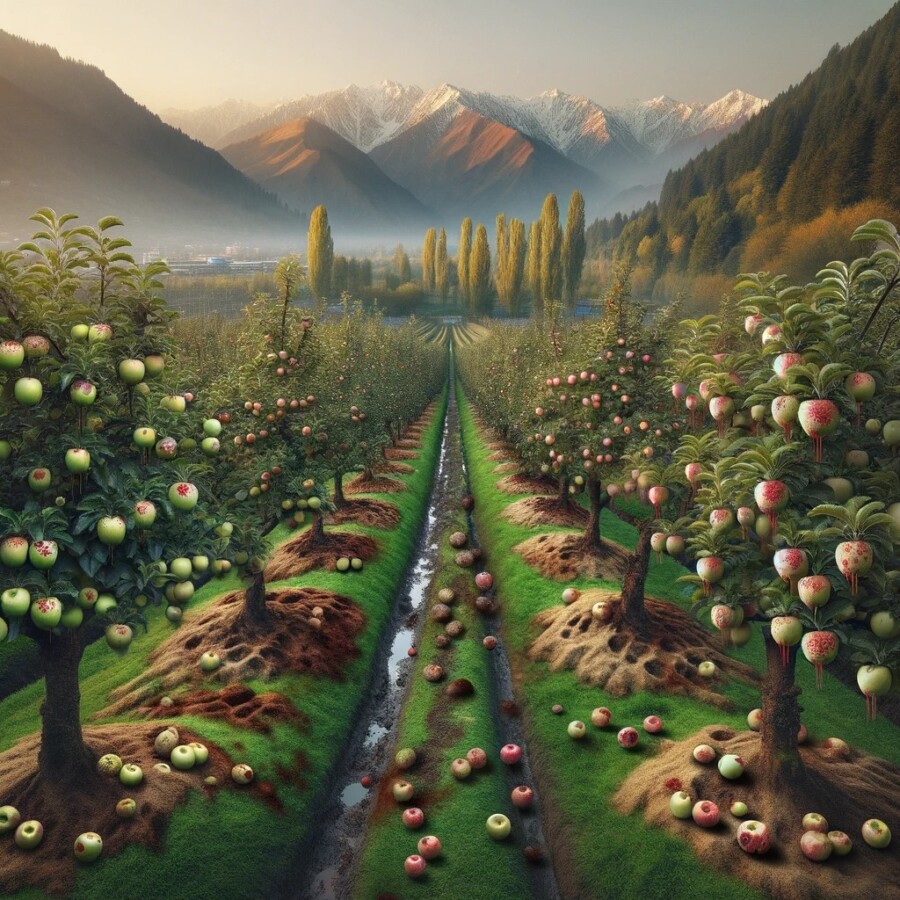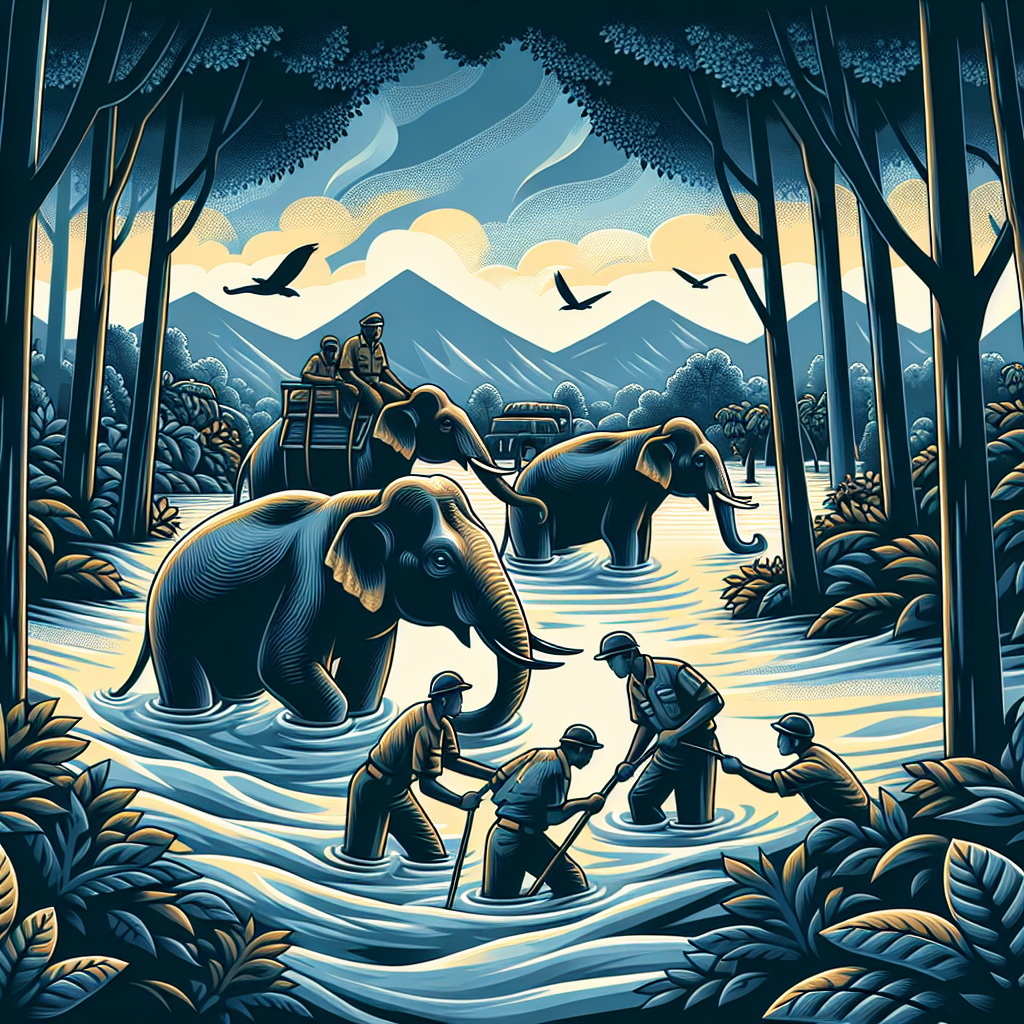The apple industry in Kashmir, India is facing a crisis due to a series of challenges. The quality of apples this year has been affected by fungal scab, climate change, and economic hurdles. Around 40% of the apple production this year has been classified as C-grade, which is the lowest quality. The apple industry in Kashmir generates a significant amount of revenue and provides employment to millions of people. However, unusual weather patterns, such as unseasonal rainfall and hailstorms, have impacted the size, quality, and quantity of the crop.
The frequency of severe weather occurrences in Kashmir has increased in recent years, leading to crop damage and loss. Extreme weather events have also caused transportation challenges for farmers, as the region becomes cut off from the rest of the country during winter due to landslides on the only road connecting Kashmir to other states. Additionally, the influx of Iranian apples in India’s fruit markets has affected the market share and price of Kashmiri apples. The Indian government’s decision to waive off tariffs on imported apples has further contributed to the drop in prices.
Kashmiri apple farmers have raised their concerns with the government and have sought intervention to resolve the crisis. They are also concerned about the sale of sub-standard pesticides, which contribute to the spread of fungal scab in orchards. The decline in income for apple farmers has a direct impact on the domestic economy, as it affects consumption and the flow of money in the market. If the apple industry continues to suffer, people from all walks of life will be impacted.
In conclusion, the apple industry in Kashmir is facing a crisis due to the impact of fungal scab, climate change, and economic challenges. Unusual weather patterns and transportation difficulties have further exacerbated the situation. The influx of imported apples and the government’s tariff waiver have also affected the market share and price of Kashmiri apples. The government’s intervention is needed to address these issues and support the apple farmers in Kashmir.
Original news source: Kashmir’s famed apples face extreme weather and economic crisis (BBC)
Listen:
Slow
Normal
Fast
Vocabulary:
| 1 | scab | A crusty or rough area on the skin or surface of something |
| 2 | revenue | The total income generated by a business or industry |
| 3 | crop | A plant or animal product that is grown or harvested for food |
| 4 | severe | Very serious or extreme |
| 5 | transportation | The act or process of moving people or goods from one place to another |
| 6 | influx | A sudden and large increase in the number of people or things |
| 7 | intervention | The act of becoming involved in a situation in order to improve or prevent something |
| 8 | decline | A decrease or reduction in quantity, quality, or value |
| 9 | impact | The powerful or lasting effect that something has on someone or something |
| 10 | concerns | Worries or anxieties about something |
| 11 | domestic | Relating to or happening within a particular country; not foreign or international |
| 12 | conclusion | The final part of something, especially a speech, book, or argument |
| 13 | challenges | Difficulties or problems that test someone’s abilities |
| 14 | unusual | Not normal or typical; strange or uncommon |
| 15 | government | The group of people who are responsible for controlling and making decisions for a country or state |
Group or Classroom Activities
Warm-up Activities:
– News Summary
Instructions: In pairs, students will read the article and then write a summary of the main points in 3-4 sentences. They can compare their summaries with a partner and discuss any differences or similarities.
– Opinion Poll
Instructions: In groups of 4-6, students will discuss their opinions on the challenges faced by the apple industry in Kashmir. They will take turns sharing their views and reasons for their opinions, and then vote on which challenge they believe is the most significant. They can also discuss possible solutions to the crisis.
– Vocabulary Pictionary
Instructions: In pairs, students will take turns choosing a vocabulary word from the article and drawing a picture to represent it. Their partner will then try to guess the word based on the drawing. They can switch roles and continue until they have practiced several vocabulary words from the article.
– Pros and Cons
Instructions: In groups of 3-4, students will discuss the pros and cons of the government’s decision to waive off tariffs on imported apples. They can create a list of arguments for and against this decision, and then present their ideas to the class. They can also engage in a debate or discussion about the topic.
– Future Predictions
Instructions: In pairs, students will imagine themselves as apple farmers in Kashmir and make predictions about the future of the apple industry. They can discuss the possible outcomes of the current crisis and how it might impact their lives and the economy. They can also share their predictions with the class and discuss their reasoning.
Comprehension Questions:
1. What are the main challenges facing the apple industry in Kashmir?
2. How has the quality of apples been affected this year?
3. How have climate change and extreme weather events impacted the apple industry in Kashmir?
4. What challenges do farmers face in transporting their crops?
5. How have Iranian apples affected the market share and price of Kashmiri apples?
6. What concerns do Kashmiri apple farmers have regarding pesticides?
7. How does the decline in income for apple farmers impact the domestic economy?
8. Why is government intervention necessary to address the crisis in the apple industry?
Go to answers ⇩
Listen and Fill in the Gaps:
The apple industry in Kashmir, India is facing a crisis due to a series of (1)______. The quality of apples this year has been (2)______ by fungal scab, climate change, and economic hurdles. Around 40% of the apple (3)______ this year has been classified as C-grade, which is the lowest quality. The apple industry in Kashmir generates a (4)______ amount of revenue and provides employment to millions of people. However, unusual weather patterns, such as unseasonal rainfall and hailstorms, have impacted the size, quality, and (5)______ of the crop.
The frequency of severe weather occurrences in (6)______ has increased in recent years, leading to crop damage and loss. Extreme weather events have also caused transportation challenges for (7)______, as the region becomes cut off from the rest of the country during winter due to landslides on the only road connecting Kashmir to (8)______ states. Additionally, the influx of Iranian apples in India’s fruit markets has affected the market share and price of Kashmiri apples. The Indian government’s decision to waive off tariffs on (9)______ apples has further contributed to the drop in prices.
Kashmiri apple farmers have raised their (10)______ with the government and have sought intervention to resolve the crisis. They are also concerned about the sale of sub-standard pesticides, which contribute to the spread of fungal scab in orchards. The decline in (11)______ for apple farmers has a direct impact on the domestic economy, as it affects (12)______ and the flow of money in the market. If the apple industry continues to suffer, people from all walks of life will be impacted.
In conclusion, the apple (13)______ in Kashmir is facing a crisis due to the impact of (14)______ scab, climate change, and economic challenges. Unusual weather patterns and (15)______ difficulties have further exacerbated the (16)______. The influx of imported apples and the government’s tariff waiver have also affected the market share and price of Kashmiri apples. The government’s intervention is needed to address these issues and support the apple farmers in Kashmir.
Go to answers ⇩
Discussion Questions:
Students can ask a partner these questions, or discuss them as a group.
1. What is the significance of the apple industry in Kashmir?
2. How would you feel if you were an apple farmer in Kashmir facing these challenges?
3. Do you think climate change is a major factor in the crisis facing the apple industry? Why or why not?
4. What do you think could be done to address the impact of fungal scab on the apple orchards?
5. How do you think the influx of Iranian apples has affected the market share and price of Kashmiri apples?
6. Do you think the government should have waived off tariffs on imported apples? Why or why not?
7. What other economic challenges do you think the apple industry in Kashmir is facing?
8. How do you think the decline in income for apple farmers affects the domestic economy?
9. What steps do you think the government should take to support the apple farmers in Kashmir?
10. Do you think imported apples should be banned in order to protect the local apple industry? Why or why not?
11. How do you think the crisis in the apple industry will impact the daily lives of people in Kashmir?
12. What are some potential solutions to the transportation challenges faced by apple farmers in Kashmir?
13. How do you think the spread of sub-standard pesticides can be prevented in orchards?
14. Do you think the apple industry in Kashmir can recover from this crisis? Why or why not?
15. What role do you think consumers can play in supporting the apple industry in Kashmir?
Individual Activities
Vocabulary Meanings:
Match each word to its meaning.
Words:
1. scab
2. revenue
3. crop
4. severe
5. transportation
6. influx
7. intervention
8. decline
9. impact
10. concerns
11. domestic
12. conclusion
13. challenges
14. unusual
15. government
Meanings:
(A) A sudden and large increase in the number of people or things
(B) The final part of something, especially a speech, book, or argument
(C) Not normal or typical; strange or uncommon
(D) A crusty or rough area on the skin or surface of something
(E) The group of people who are responsible for controlling and making decisions for a country or state
(F) Difficulties or problems that test someone’s abilities
(G) Relating to or happening within a particular country; not foreign or international
(H) A plant or animal product that is grown or harvested for food
(I) The act of becoming involved in a situation in order to improve or prevent something
(J) The act or process of moving people or goods from one place to another
(K) A decrease or reduction in quantity, quality, or value
(L) The total income generated by a business or industry
(M) Very serious or extreme
(N) Worries or anxieties about something
(O) The powerful or lasting effect that something has on someone or something
Go to answers ⇩
Multiple Choice Questions:
1. What is the main cause of the decline in the quality of apples in Kashmir this year?
(a) Fungal scab
(b) Climate change
(c) Economic hurdles
(d) All of the above
2. What percentage of apple production in Kashmir this year has been classified as C-grade?
(a) 40%
(b) 60%
(c) 20%
(d) 80%
3. What has contributed to transportation challenges for apple farmers in Kashmir?
(a) Unseasonal rainfall and hailstorms
(b) Landslides on the only road connecting Kashmir to other states
(c) Influx of Iranian apples
(d) Sub-standard pesticides
4. What has affected the market share and price of Kashmiri apples?
(a) Government’s decision to waive off tariffs on imported apples
(b) Fungal scab
(c) Influx of Iranian apples
(d) All of the above
5. What have Kashmiri apple farmers sought from the government?
(a) Sale of sub-standard pesticides
(b) Increase in tariffs on imported apples
(c) None of the above
(d) Intervention to resolve the crisis
6. How does the decline in income for apple farmers impact the domestic economy?
(a) It leads to an increase in tariffs on imported apples
(b) It affects consumption and the flow of money in the market
(c) It causes landslides on the only road connecting Kashmir to other states
(d) It results in a decrease in the influx of Iranian apples
7. What is the main cause of crop damage and loss in Kashmir?
(a) Fungal scab
(b) Influx of imported apples
(c) Landslides on the only road connecting Kashmir to other states
(d) Extreme weather events
8. What is needed to address the issues faced by the apple industry in Kashmir?
(a) Increase in tariffs on imported apples
(b) Sale of sub-standard pesticides
(c) Government’s intervention
(d) All of the above
Go to answers ⇩
True or False Questions:
1. The apple industry in Kashmir, India is currently facing a crisis.
2. Severe weather occurrences in Kashmir have increased in recent years, leading to crop damage and loss.
3. The apple industry in Kashmir generates significant revenue and provides employment to millions of people.
4. Normal weather patterns, including seasonal rainfall and absence of hailstorms, have improved the size, quality, and quantity of the apple crop.
5. Kashmiri apple farmers have raised concerns with the government and sought intervention to resolve the crisis.
6. Approximately 40% of the apple production this year has been classified as A-grade, the highest quality.
7. Pest infestation, climate change, and economic hurdles have improved the quality of apples this year.
8. The lack of Iranian apples in India’s fruit markets has affected the market share and price of Kashmiri apples.
Go to answers ⇩
Write a Summary:
Write a summary of this news article in two sentences.
Check your writing now with the best free AI for English writing!
Writing Questions:
Answer the following questions. Write as much as you can for each answer.
Check your answers with our free English writing assistant!
1. What are the main challenges facing the apple industry in Kashmir, India?
2. How has climate change affected the quality and quantity of apple production in Kashmir?
3. What are the transportation challenges faced by apple farmers in Kashmir?
4. How has the influx of imported apples affected the market share and price of Kashmiri apples?
5. Why is the decline in income for apple farmers in Kashmir a concern for the domestic economy?
Answers
Comprehension Question Answers:
1. What are the main challenges facing the apple industry in Kashmir?
The main challenges facing the apple industry in Kashmir are fungal scab, climate change, and economic hurdles.
2. How has the quality of apples been affected this year?
The quality of apples this year has been affected by fungal scab, resulting in around 40% of the apple production being classified as C-grade, which is the lowest quality.
3. How have climate change and extreme weather events impacted the apple industry in Kashmir?
Climate change and extreme weather events, such as unseasonal rainfall and hailstorms, have impacted the size, quality, and quantity of the apple crop in Kashmir.
4. What challenges do farmers face in transporting their crops?
Farmers in Kashmir face transportation challenges due to landslides on the only road connecting the region to other states, particularly during winter when the region becomes cut off from the rest of the country.
5. How have Iranian apples affected the market share and price of Kashmiri apples?
The influx of Iranian apples in India’s fruit markets has affected the market share and price of Kashmiri apples, as they face competition from imported apples.
6. What concerns do Kashmiri apple farmers have regarding pesticides?
Kashmiri apple farmers are concerned about the sale of sub-standard pesticides, which contribute to the spread of fungal scab in orchards.
7. How does the decline in income for apple farmers impact the domestic economy?
The decline in income for apple farmers has a direct impact on the domestic economy, as it affects consumption and the flow of money in the market.
8. Why is government intervention necessary to address the crisis in the apple industry?
Government intervention is necessary to address the crisis in the apple industry because it can help resolve issues related to fungal scab, provide support to farmers, regulate the sale of pesticides, and address the economic challenges faced by the industry.
Go back to questions ⇧
Listen and Fill in the Gaps Answers:
(1) challenges
(2) affected
(3) production
(4) significant
(5) quantity
(6) Kashmir
(7) farmers
(8) other
(9) imported
(10) concerns
(11) income
(12) consumption
(13) industry
(14) fungal
(15) transportation
(16) situation
Go back to questions ⇧
Vocabulary Meanings Answers:
1. scab
Answer: (D) A crusty or rough area on the skin or surface of something
2. revenue
Answer: (L) The total income generated by a business or industry
3. crop
Answer: (H) A plant or animal product that is grown or harvested for food
4. severe
Answer: (M) Very serious or extreme
5. transportation
Answer: (J) The act or process of moving people or goods from one place to another
6. influx
Answer: (A) A sudden and large increase in the number of people or things
7. intervention
Answer: (I) The act of becoming involved in a situation in order to improve or prevent something
8. decline
Answer: (K) A decrease or reduction in quantity, quality, or value
9. impact
Answer: (O) The powerful or lasting effect that something has on someone or something
10. concerns
Answer: (N) Worries or anxieties about something
11. domestic
Answer: (G) Relating to or happening within a particular country; not foreign or international
12. conclusion
Answer: (B) The final part of something, especially a speech, book, or argument
13. challenges
Answer: (F) Difficulties or problems that test someone’s abilities
14. unusual
Answer: (C) Not normal or typical; strange or uncommon
15. government
Answer: (E) The group of people who are responsible for controlling and making decisions for a country or state
Go back to questions ⇧
Multiple Choice Answers:
1. What is the main cause of the decline in the quality of apples in Kashmir this year?
Answer: (a) Fungal scab
2. What percentage of apple production in Kashmir this year has been classified as C-grade?
Answer: (a) 40%
3. What has contributed to transportation challenges for apple farmers in Kashmir?
Answer: (b) Landslides on the only road connecting Kashmir to other states
4. What has affected the market share and price of Kashmiri apples?
Answer: (c) Influx of Iranian apples
5. What have Kashmiri apple farmers sought from the government?
Answer: (d) Intervention to resolve the crisis
6. How does the decline in income for apple farmers impact the domestic economy?
Answer: (b) It affects consumption and the flow of money in the market
7. What is the main cause of crop damage and loss in Kashmir?
Answer: (d) Extreme weather events
8. What is needed to address the issues faced by the apple industry in Kashmir?
Answer: (c) Government’s intervention
Go back to questions ⇧
True or False Answers:
1. The apple industry in Kashmir, India is currently facing a crisis. (Answer: True)
2. Severe weather occurrences in Kashmir have increased in recent years, leading to crop damage and loss. (Answer: True)
3. The apple industry in Kashmir generates significant revenue and provides employment to millions of people. (Answer: True)
4. Normal weather patterns, including seasonal rainfall and absence of hailstorms, have improved the size, quality, and quantity of the apple crop. (Answer: False)
5. Kashmiri apple farmers have raised concerns with the government and sought intervention to resolve the crisis. (Answer: True)
6. Approximately 40% of the apple production this year has been classified as A-grade, the highest quality. (Answer: False)
7. Pest infestation, climate change, and economic hurdles have improved the quality of apples this year. (Answer: False)
8. The lack of Iranian apples in India’s fruit markets has affected the market share and price of Kashmiri apples. (Answer: False)
Go back to questions ⇧















